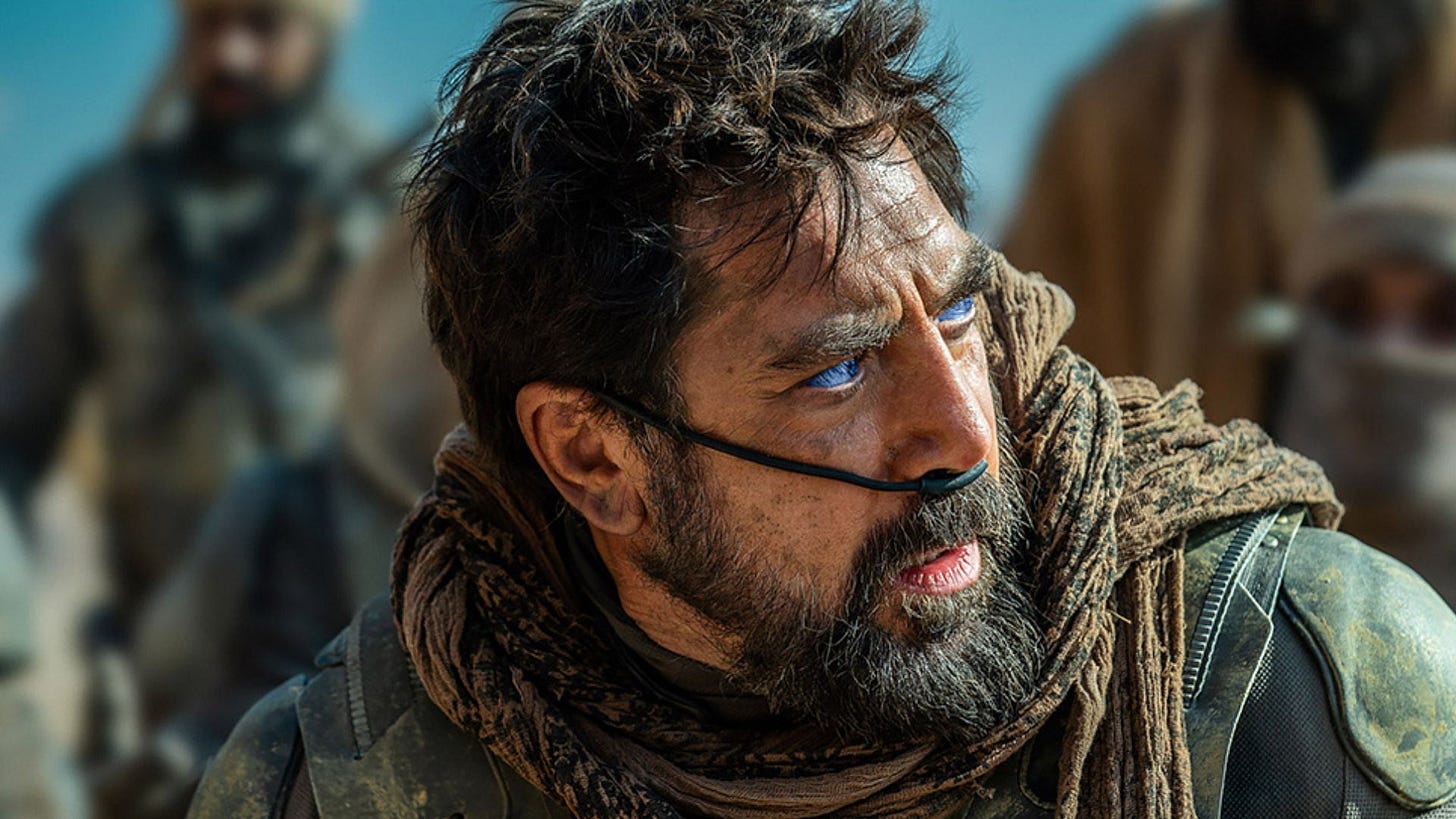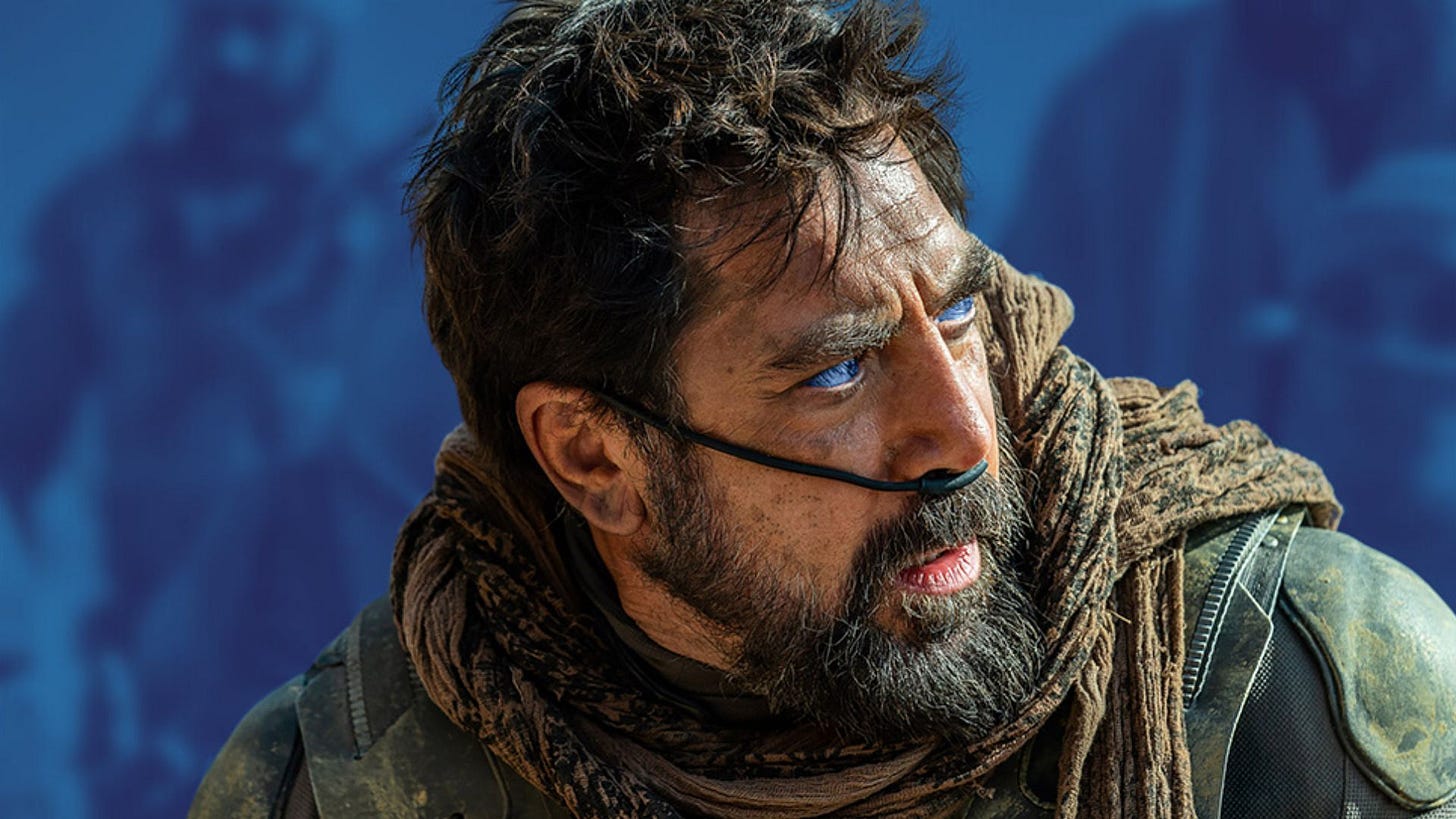Religion and Abuse of Power in Dune: Part Two
“Religious abuse really isn’t a new concept,” my dad mentions in the car last week as I drive him to the airport for a conference. “Spiritual leaders have been abusing their power even going back to biblical times, just like in 1 Samuel.” My dad’s a pastor, so topics like these inevitably come up when we talk about the successes and failures of the church. Funny enough, neither my dad or I has read Dune, so little did we know just how relevant this discussion would be less than one week later when I watched Denis Villeneuve’s new film, Dune: Part Two.
Dune: Part Two explores “the mythic journey of Paul Atreides as he unites with Chani and the Fremen while on a path of revenge against the conspirators who destroyed his family. Facing a choice between the love of his life and the fate of the known universe, he endeavors to prevent a terrible future only he can foresee.”
To say Dune: Part Two shocked me would be an understatement. Even after days of hearing what a masterpiece it was, I was blown away by the spectacle of it all and the thematic richness. Frank Herbert’s Dune novels have long been considered unadaptable due to the sheer scope of each book and the both strange and controversial choices within. Hollywood’s most infamous past attempt, David Lynch’s 1984 film adaptation, was considered a disaster and Lynch’s own greatest career regret. But this adaptation was breathtaking, the performances layered, the cinematography dreamy, but grounded, and the music tonally perfect.
But the most surprising and interesting angle of the film (for me at least) was the way in which it showed the dangers of religious fanaticism and how religious leaders can abuse and manipulate their followers. Below I’ll break down how Dune: Part Two gives us glimpses of false messiahs, corrupt priests, and blind followers. Spoilers below.
False Messiahs: “A Great Man Doesn’t Seek To Lead”
In the first Dune film, a timid Paul expresses that he may not be cut out to lead. His father, Duke Leto Atreides quotes Paul’s grandfather, saying, “A great man doesn't seek to lead. He's called to it. And he answers.”
Fast forward to Dune: Part Two and Paul understands the power he could hold over the Fremen people by claiming to be their savior, the ‘Lisan al Gaib.’ Even in the earlier portions of the film, though Paul is resistant to that title, he still uses the people’s hopes against them to get what he wants, revenge for his father’s death.
But as the film goes on and he realizes he has no other path to success, Paul fully embraces the “prophecies,” naming himself as the Fremen’s messiah and leading them into battle against their enemies. Director Denis Villeneuve and cinematographer Greig Fraser capture Paul’s terrifying ascendency in an electric way, the camera frantically following him and turning around him as he speaks to the gathering of the Fremen people. It’s surprising camerawork that Villeneuve usually reserves for action scenes, but instead is used here to showcase this shift in Paul’s personality and mindset.
Paul’s terrifying ascension to power mirrors countless others who have used religion as a manipulative tool, whether in 1 Samuel (which I’ll discuss later on), the medieval Crusades, or even the dangerous modern blending of the Republican party with parts of the evangelical church.
Jesus was quick to warn his disciples of these manipulative leaders in the Gospel of Matthew, saying “If anyone says to you, ‘Look, here is the Messiah!’ or, ‘There he is!’ do not believe it. For false messiahs and false prophets will appear and perform great signs and wonders to deceive God’s chosen people” (24.23-24).
Corrupt Priests: “Start with the Weaker Ones”
Paul Atreides saw the Fremen people yearning for a savior, and he used that to his advantage to get what he wanted and deceive them. But he wasn’t acting alone; his rise to power was aided by the Bene Gesserit, a sisterhood of magical, powerful religious figures.
Unbeknownst to most in Dune, the Bene Gesserit spent generations planting seeds across the galaxy for a messianic figure to rise. Through carefully crossing bloodlines and writing vague prophecies that could be fulfilled in a multitude of ways, they have created a space for this leader to rise, and ultimately be controlled by them. As Reverend Mother Mohiam says in Dune, “our plans are measured in centuries: we have other prospects if [Paul] fails his promise.”
Early in Dune: Part Two, Paul’s mother Lady Jessica, a Bene Gesserit herself, becomes Reverend Mother over the Fremen people. She sees this as the perfect way to prepare people to accept Paul as the Chosen One. “We need all the Fremen to believe in the prophecy,” she says. “We must convert the non-believers one by one. We need to start with the weaker ones, the vulnerable ones, the ones who fear us.”

The Bene Gesserit also have a skill called the Voice, a manipulation of their speech that causes others to listen and do what they are told (think of the Jedi mind trick in Star Wars, which was probably itself inspired by this aspect of the Dune novel). While this powerful weapon of speech is literalized in the world of Dune, we can also take it as a metaphor for the way in which countless religious leaders in the past have used their position and voice to control and manipulate their followers.
1 Samuel 2:12 mentions that “Eli's sons were priests, but they were dishonest and refused to obey the Lord,” going on to describe the ways in which they would steal the people’s sacrifices to God and keep the best food for themselves. In the New Testament, we see Jesus angered at what the Temple has become and condemning the Jewish leaders:
Everything they do is just to show off in front of others. They even make a big show of wearing Scripture verses on their foreheads and arms, and they wear big tassels for everyone to see. [They] are nothing but snakes and the children of snakes!
- Matthew 23:5, 33
The description Jesus laid out in those verses could practically be applied to Lady Jessica in the Dune films, scripture written on her head to maintain the appearance of holiness, while really just a snake pushing her own agenda and grasping at power. So while Paul Atreides is to blame for his insincere and manipulative rise to power, it could never have happened without the corrupt priests that had been laying the groundwork for this to happen long before Paul was even born.
How have church leaders, past or present, failed Christian followers by endorsing false saviors or pushing agendas instead of pointing to God’s grace through Christ Jesus?
Blind Followers: “You Have the Power To Stop This”
Stilgar is a deeply religious Fremen warrior, and one of the first to believe that Paul could be their long awaited messiah. People look up to Stilgar and trust his opinions and beliefs. So while the Bene Gesserit are using their position as religious figureheads to push the prophecy, Stilgar is eagerly eating up their claims and spreading his thoughts to others, even though signs were right in front of him pointing to reasons why Paul might not be their chosen one.

It’s easy to blame religious figures and false messiahs for the wrongs they inflict on the world, but the truth is, each and every one of us is responsible for keeping the faith and avoiding those who are misleading us.
Going back to the story in 1 Samuel, God doesn’t just punish Eli’s sons; he punishes Eli too: “I told [Eli] that I would judge his family forever because of the sin he knew about; his sons blasphemed God, and he failed to restrain them” (3.13). Eli saw his sons abusing power and didn’t stop it. And that enabled the abuse to continue.
In 2022, Pastor J.D. Greear explained the sin of silence:
When it comes to spiritual abuse, silence is as sinful as the acts themselves. There’s probably nothing as damaging, spiritually, as when a spiritual leader…uses that position to exploit and take advantage of those people. And it is equally grievous when other leaders like Eli…won’t take action to expose these wolves-in-sheep’s-clothing and get them out of the church.
As mentioned earlier, when Dune: Part Two reaches the third act, Paul storms into a meeting of the Southern Fremen and declares himself to be the Lisan al Gaib. An angry and devastated Chani (Zendaya) seeks to stop Paul’s ascension to power, screaming at Stilgar as he bows in worship, “You have the power to stop this.” Ultimately, Stilgar was silent, and allowed Paul to take control of his people.
Chani’s words echoed with me long after the movie was over, a call to anyone and everyone that has a voice: “You have the power to stop this.”
Our True Hope

We’re left with a far from happy ending in Dune: Part Two, a scathing indictment of the failures of religion and the evils of man. Paul grabs at more and more power and burns bridges with Chani, seemingly the only voice of reason left by the film’s end.
It’s easy to feel discouraged or bitter towards the church when watching a film like this that’s so evocative of its failures. What hope can we have when man is so hopeless?
But that’s when we should be reminded that our savior wasn’t merely a man, but the Word made flesh. He didn’t perpetuate lies or violence, but instead he showed where true hope and peace was found. He wasn’t selfish or sinful, but blameless, a sacrificial lamb.
Christ was truly God. But he did not try to remain equal with God. Instead he gave up everything and became a slave, when he became like one of us. Christ was humble. He obeyed God and even died on a cross. Then God gave Christ the highest place and honored his name above all others. So at the name of Jesus everyone will bow down, those in heaven, on earth, and under the earth. And to the glory of God the Father everyone will openly agree, “Jesus Christ is Lord!”
- Philippians 2:6-11




